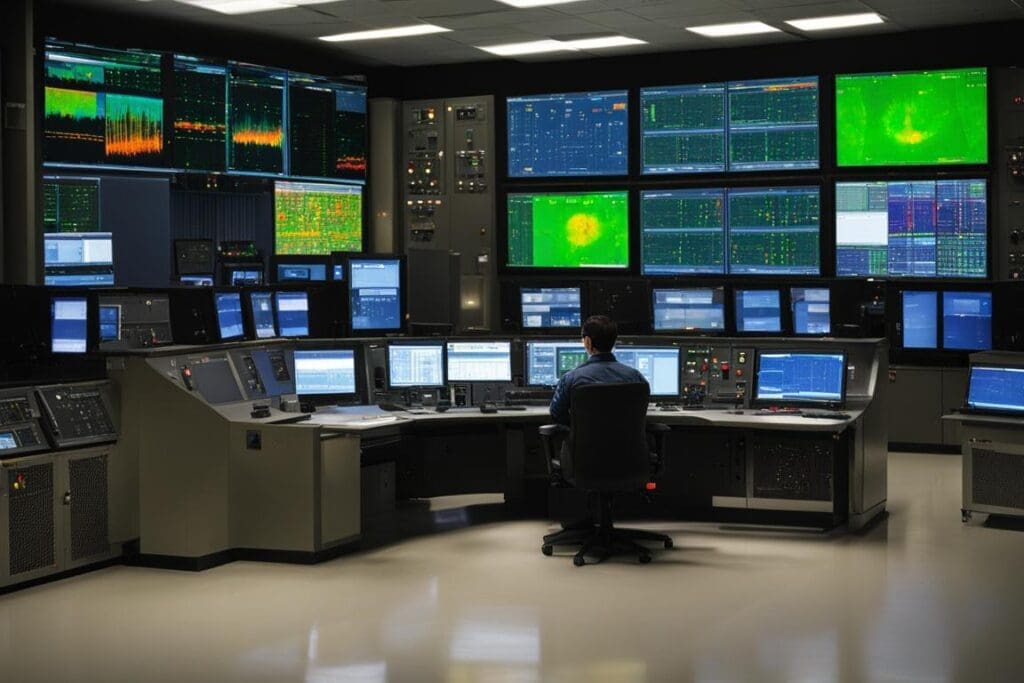Artificial intelligence (AI) is revolutionizing the energy sector, transforming how power is generated, distributed, and consumed. AI has the potential to optimize energy systems, improve efficiency, and contribute to a more sustainable future. This article will explore the various applications of AI in the energy industry and its transformative impact on renewable energy, smart grids, energy storage, and more.
Key Takeaways:
- AI is revolutionizing the energy sector by transforming power generation, distribution, and consumption.
- AI enables energy optimization and contributes to a more sustainable future.
- Applications of AI in energy include renewable energy forecasting, smart grid technology, and energy management.
- AI enhances energy efficiency and improves reliability in various sectors of the energy industry.
- The future of AI in the energy industry holds tremendous promise for innovation and transition to clean energy.
The Impact of AI on Energy Supply
AI is revolutionizing the energy supply sector, transforming the way we generate and distribute power. Its applications in the energy industry are far-reaching, impacting both traditional and renewable energy sources. In the oil and gas industry, AI algorithms are improving the efficiency of extraction processes by enhancing the mapping and understanding of underground deposits. This optimization leads to more cost-effective extraction methods and increased accessibility of energy resources.
Moreover, AI is making significant contributions to renewable energy sources such as wind and solar farms. By utilizing AI-assisted training, these farms can optimize energy generation by adjusting turbine heads and improving solar forecasting.
AI is revolutionizing the energy supply sector, transforming the way we generate and distribute power.
Although the impact of AI is currently more evident in traditional hydrocarbon industries, it is also instrumental in advancing renewable energy sources. By harnessing the power of AI, the energy supply sector benefits from increased efficiency, reduced costs, and a more sustainable approach to energy generation and distribution.
| AI Impacts on Energy Supply | AI Applications |
|---|---|
| Oil and Gas Industry | Enhanced mapping of underground deposits |
| Renewable Energy | Optimized energy generation in wind and solar farms |
As AI technologies continue to advance, we can expect even greater optimization of energy supply systems and increased integration of renewable energy sources into our energy grids.
The Future of AI in Energy Supply
Looking ahead, the future of AI in the energy supply sector is promising. Continued advancements in AI algorithms and technologies will lead to further optimization, increased accessibility, and greater sustainability in energy generation and distribution. The potential for AI to revolutionize the energy sector is limitless, and it will play a crucial role in shaping the future of our energy systems.
AI’s Influence on Energy Demand and Markets
Artificial Intelligence (AI) is reshaping the energy industry by revolutionizing energy demand and market dynamics. With its advanced algorithms and predictive capabilities, AI plays a crucial role in optimizing energy usage, enabling efficient demand response management, and revolutionizing energy trading.
One of the key impacts of AI on energy demand is its ability to predict consumption patterns. By analyzing historical data and external factors such as weather conditions, AI algorithms can accurately forecast energy consumption, allowing for proactive energy management and optimization. This not only helps balance energy supply and demand but also contributes to cost savings and grid stability.
AI also enhances demand response management, enabling real-time monitoring and automated responses to fluctuations in energy demand. AI-driven systems can detect sudden changes in demand and automatically adjust energy usage, ensuring efficient and reliable energy supply. This is particularly valuable during peak demand periods when electricity prices can fluctuate significantly.
“AI enables more efficient energy usage by predicting consumption patterns, optimizing demand response management, and facilitating real-time energy purchasing decisions.”
Furthermore, AI is transforming the energy trading landscape by analyzing market trends and executing trades at lightning speed. By leveraging real-time data and market insights, AI algorithms can identify profitable opportunities and execute trades with precision. This not only improves trading efficiency but also enhances market liquidity and price discovery.
The Impact of AI on Energy Demand and Markets
| AI Applications | Benefits |
|---|---|
| Predictive analytics for energy consumption | Optimized energy management, cost savings |
| Automated demand response management | Efficient energy usage, grid stability |
| AI-driven energy trading | Improved trading efficiency, enhanced market liquidity |
In summary, AI has a profound influence on energy demand and markets, driving efficiency, cost savings, and sustainability. Its predictive capabilities enable accurate consumption forecasting, optimizing demand response management, and facilitating real-time energy purchasing decisions. Moreover, AI-driven energy trading enhances market efficiency and liquidity, fostering a more dynamic and competitive energy marketplace.
Enhancing Energy Efficiency with AI
Artificial intelligence (AI) is revolutionizing the energy sector, including its impact on enhancing energy efficiency. With AI-powered technologies, businesses and organizations are able to optimize their energy consumption, reduce waste, and improve overall operational efficiency. AI is being utilized in various areas, such as predictive maintenance and energy storage, to drive significant improvements in energy efficiency.
One of the key applications of AI in energy efficiency is predictive maintenance. By analyzing large amounts of data from equipment sensors, AI algorithms can detect patterns and anomalies that indicate potential equipment failures. This allows for proactive maintenance, preventing costly breakdowns and minimizing downtime. The ability of AI to predict maintenance needs enables energy providers to optimize their maintenance schedules, ensuring that equipment is serviced at the right time, reducing costs, and enhancing reliability.
Another area where AI is making a significant impact on energy efficiency is in energy storage systems. AI algorithms can optimize the allocation and distribution of energy from renewable sources, such as solar and wind, based on real-time conditions and demand. This means that energy storage systems can intelligently store energy during periods of high generation and release it during peak demand, maximizing the utilization of renewable energy and reducing reliance on non-renewable sources. AI-powered energy storage solutions contribute to a more stable and reliable energy supply while minimizing waste and reducing carbon emissions.
| AI Applications in Energy Efficiency | Benefits |
|---|---|
| Predictive Maintenance | – Reduces equipment downtime\n- Optimizes maintenance schedules\n- Enhances equipment reliability\n |
| Energy Storage Optimization | – Maximizes utilization of renewable energy\n- Minimizes reliance on non-renewable sources\n- Improves stability of energy supply\n |
AI-driven advancements in energy efficiency contribute to a more sustainable and resilient energy sector.
In conclusion, AI has a crucial role to play in enhancing energy efficiency. Its applications in predictive maintenance and energy storage optimization enable businesses and organizations to optimize their energy consumption, reduce waste, and contribute to a more sustainable future. By harnessing the power of AI, the energy sector can continue to drive improvements in energy efficiency and pave the way for a greener and more efficient energy landscape.
The Role of AI in Renewable Energy Forecasting
Renewable energy forecasting is a critical aspect of optimizing energy generation and ensuring the efficient integration of renewable sources into the grid. With the help of artificial intelligence (AI), accurate predictions can be made based on weather data, historical generation data, and real-time conditions. By analyzing vast amounts of information, AI algorithms enable better planning, grid management, and balancing of energy supply and demand.
AI in renewable energy forecasting plays a vital role in addressing the inherent variability and intermittency of renewable energy sources such as solar and wind power. By accurately predicting the availability of renewable energy, AI assists in maximizing energy generation and reducing reliance on traditional fossil fuel-based power plants.
One of the key applications of AI in renewable energy forecasting is weather data analysis. AI algorithms can analyze complex weather patterns, taking into account factors such as temperature, wind speed, cloud cover, and solar irradiance. This analysis helps in predicting solar and wind power generation with greater accuracy, allowing grid operators to make informed decisions regarding energy production and distribution.
Benefits of AI in Renewable Energy Forecasting
- Improved grid management: Accurate renewable energy forecasting enables better grid management by ensuring a stable and reliable energy supply, reducing the risk of power outages.
- Cost reduction: By optimizing renewable energy generation and reducing reliance on traditional power plants, AI helps in reducing energy costs and dependence on fossil fuels.
- Increased efficiency: AI algorithms enable more efficient energy utilization by aligning energy generation with demand, reducing waste and improving overall energy efficiency.
“AI in renewable energy forecasting is revolutionizing the energy sector by enabling better integration of renewable sources, reducing costs, and promoting a more sustainable energy future.” – Energy Expert
Overall, the role of AI in renewable energy forecasting is crucial for the successful transition to a clean and efficient energy landscape. By leveraging AI technologies, we can optimize energy generation, reduce greenhouse gas emissions, and drive the adoption of renewable energy sources.
AI’s Contribution to Smart Grids and Energy Management
Artificial intelligence (AI) is revolutionizing the energy industry, particularly in the realm of smart grids and energy management. Smart grids equipped with AI capabilities enable more efficient grid management and energy distribution, leading to a more sustainable and reliable energy sector. With AI algorithms predicting consumption patterns and optimizing electricity allocation, smart grids can dynamically respond to high-demand periods, reducing energy waste and ensuring grid stability.
AI also plays a crucial role in energy management, both at the grid level and in individual homes and buildings. By continuously monitoring energy consumption and making data-driven decisions, AI enables energy optimization and cost reduction. AI-driven energy management systems take into account factors such as occupancy patterns, weather conditions, and price fluctuations to intelligently adjust energy usage and promote energy efficiency. Through AI, consumers have greater control over their energy consumption and can actively contribute to a more sustainable energy future.
Moreover, AI helps enhance grid reliability by detecting faults or disruptions in the grid and facilitating quick responses. With real-time monitoring and analysis, AI systems can identify potential issues and enable proactive maintenance, minimizing downtime and improving grid performance. By optimizing fault detection and response, AI contributes to grid resilience and ensures the continuous supply of electricity to consumers.
Table – Benefits of AI in Smart Grids and Energy Management
| Benefits | Description |
|---|---|
| Improved Efficiency | AI algorithms optimize grid operations and energy distribution, reducing energy waste and improving overall efficiency. |
| Cost Reduction | By intelligently managing energy consumption, AI helps consumers and businesses reduce energy costs. |
| Promotes Sustainability | AI-driven energy management enables greener practices by promoting energy efficiency and reducing carbon emissions. |
| Enhanced Reliability | AI systems detect faults in the grid, enabling proactive maintenance and ensuring a reliable supply of electricity. |
| Grid Stability | With AI’s ability to predict consumption patterns, smart grids can allocate electricity efficiently, maintaining grid stability during peak demand periods. |
The integration of AI into smart grids and energy management systems brings numerous benefits to the energy sector. By harnessing AI’s capabilities, we can build a more sustainable, efficient, and reliable energy infrastructure that can meet the demands of the future.
AI and Carbon Capture, Utilization, and Storage (CCUS)
AI is playing a crucial role in advancing carbon capture, utilization, and storage (CCUS) technologies, which are essential for mitigating climate change and achieving global emission reduction targets. By leveraging AI algorithms and data analytics, researchers and scientists are optimizing the capture, utilization, and safe storage of carbon dioxide (CO2).
One of the key areas where AI is making a significant impact is in the optimization of carbon capture processes. AI algorithms analyze vast amounts of data to identify the most efficient and cost-effective methods for capturing CO2 from various emission sources such as power plants and industrial facilities. This not only reduces greenhouse gas emissions but also enables the development of more sustainable energy solutions.
| AI Applications in CCUS | Benefits |
|---|---|
| Optimizing carbon capture methods | Reduces greenhouse gas emissions and cost-effective CO2 capture |
| Enhancing carbon utilization | Enables the transformation of captured CO2 into valuable products |
| Optimizing carbon storage | Identifies the most suitable geological formations for safe and long-term storage |
AI also contributes to the utilization of captured CO2 by identifying innovative ways to convert it into useful products. By analyzing data and applying machine learning algorithms, AI systems can identify the most suitable processes and technologies for converting captured CO2 into valuable commodities, such as building materials, chemicals, and fuels.
Furthermore, AI is instrumental in optimizing the storage of captured CO2 in geological formations. By analyzing geological data, AI algorithms can identify the most suitable sites for safe and secure storage, preventing CO2 leakage and minimizing environmental risks. This ensures that the captured CO2 remains stored for long periods, effectively reducing its impact on the atmosphere.
The integration of AI in CCUS technologies holds great promise for addressing the challenges of climate change. By optimizing carbon capture, utilization, and storage processes, AI is contributing to the development of a more sustainable and low-carbon future.
AI in Oil and Gas Exploration
The use of AI in oil and gas exploration has brought about significant advancements in the industry. With the ability to analyze large amounts of geological data, AI algorithms have revolutionized the way reserves are identified and assessed. By applying machine learning techniques, AI systems can identify potential oil and gas deposits that may have been overlooked using traditional methods. This has led to a more precise and efficient exploration process, ultimately improving the viability and profitability of drilling operations.
One of the key areas where AI has made a significant impact is in drilling operations. By leveraging AI technologies, companies can optimize drilling processes by considering factors such as geological formations, equipment performance, and environmental conditions. This enables safer and more efficient drilling, reducing the risk of accidents and maximizing the success rate of oil and gas extraction.
Furthermore, AI has also played a vital role in geological data analysis. By analyzing vast amounts of data from seismic surveys, well logs, and other sources, AI algorithms can provide valuable insights into subsurface structures and formations. This helps geologists and engineers make informed decisions about drilling locations, reservoir characteristics, and potential production rates. With AI-powered geological analysis, oil and gas exploration companies can improve their understanding of subsurface conditions and optimize their exploration strategies.
| Advantages of AI in Oil and Gas Exploration | Challenges of AI in Oil and Gas Exploration |
|---|---|
|
|
“The use of AI in oil and gas exploration has revolutionized the industry, enabling more efficient and effective exploration processes. By leveraging AI algorithms and machine learning techniques, companies can identify potential reserves with greater accuracy, optimize drilling operations, and improve geological data analysis. However, challenges such as the cost of implementation and the shortage of trained AI professionals need to be addressed to fully capitalize on the benefits of AI in the oil and gas sector.”
AI in Nuclear Power Plant Monitoring
Nuclear power plants require rigorous monitoring and maintenance to ensure safe and reliable operations. Artificial intelligence (AI) is playing a crucial role in enhancing nuclear power plant monitoring by continuously analyzing data from various sensors and instruments. AI systems detect anomalies and deviations from safety standards, allowing for early detection and preventive actions. Additionally, AI-driven predictive maintenance models assess equipment performance and anticipate potential failures, maximizing plant efficiency and reducing the risk of accidents.
With the ability to process large amounts of data in real-time, AI in nuclear power plant monitoring improves the overall safety and reliability of nuclear energy generation. By continuously monitoring and analyzing data from sensors throughout the plant, AI algorithms can identify potential safety risks and notify operators in real-time. This proactive approach allows for the swift implementation of safety measures, minimizing the likelihood of incidents.
“AI in nuclear power plant monitoring enables the early detection of anomalies and deviations, enhancing overall plant safety and reliability.”
In addition to safety monitoring, AI also contributes to optimizing maintenance procedures in nuclear power plants. By analyzing historical performance data and current operating conditions, AI models can predict equipment failures and recommend maintenance schedules. This proactive maintenance approach helps prevent unexpected breakdowns, reduces downtime, and improves the efficiency of nuclear power plant operations.
Table: Benefits of AI in Nuclear Power Plant Monitoring
| Benefits | Description |
|---|---|
| Early anomaly detection | AI systems can detect anomalies and deviations from safety standards, allowing for swift action to prevent accidents. |
| Predictive maintenance | AI-driven models can predict equipment failures and recommend maintenance schedules, improving plant efficiency and reducing downtime. |
| Real-time monitoring | AI continuously analyzes data from sensors throughout the plant, providing operators with real-time information to ensure safe and reliable operations. |
Overall, AI in nuclear power plant monitoring is a valuable tool in enhancing safety, reliability, and efficiency in nuclear energy generation. By leveraging the power of AI algorithms and real-time data analysis, nuclear power plants can operate more effectively, minimizing risks and ensuring a sustainable and secure energy source for the future.
The Challenges and Future of AI in the Energy Industry
While the integration of artificial intelligence (AI) in the energy industry presents significant opportunities, it also comes with its fair share of challenges. As AI continues to revolutionize how power is generated, distributed, and consumed, there are several key obstacles that need to be addressed.
One of the main challenges is the upfront cost of implementing AI systems. The adoption of AI technologies requires substantial investments in infrastructure, data management, and training. Many organizations may face difficulties in allocating the necessary resources to embark on AI projects, hindering their ability to fully leverage the potential benefits.
Data security and privacy are also critical concerns in the energy sector. As AI relies on vast amounts of data to make accurate predictions and optimize energy systems, the safeguarding of sensitive information becomes paramount. Ensuring robust cybersecurity measures and maintaining compliance with data protection regulations are vital to building trust and confidence in AI-powered solutions.
| Challenges of AI in the Energy Sector | Solutions |
|---|---|
| Upfront cost of implementing AI systems | Securing funding and establishing partnerships to share resources and costs. |
| Data security and privacy concerns | Implementing robust cybersecurity measures and complying with data protection regulations. |
| Shortage of trained AI professionals with industry expertise | Investing in AI education and training programs to develop a skilled workforce. |
Additionally, there is a shortage of trained AI professionals with industry expertise. The energy sector requires professionals who understand the complex interplay between AI technologies and energy systems. Investing in AI education and training programs can help bridge this skills gap, ensuring that organizations have the talent and knowledge necessary to implement and manage AI solutions effectively.
Despite these challenges, the future of AI in the energy industry is promising. Continuous advancements in AI technologies, such as machine learning and predictive analytics, will drive innovation and enable further optimization of energy generation, distribution, and consumption. As the energy sector continues to prioritize efficiency, sustainability, and resilience, AI will play a crucial role in achieving these goals.
Conclusion
In conclusion, the transformative impact of AI in the energy sector is undeniable. AI has revolutionized how power is generated, distributed, and consumed, bringing significant benefits to the industry. By optimizing energy systems, improving efficiency, and contributing to sustainability, AI has become a vital tool in the transition towards a cleaner and more efficient energy landscape.
The applications of AI in the energy sector are vast and diverse. From enhancing energy supply and demand management to improving renewable energy forecasting and enabling smart grids, AI plays a crucial role in shaping the future of the industry. By leveraging AI-powered solutions, energy companies can reduce costs, improve reliability, and drive innovation in the pursuit of a sustainable energy future.
Looking ahead, the future prospects of AI in the energy industry are promising. Continued advancements in AI technologies will further optimize energy generation, distribution, and consumption. As AI becomes more accessible and integrated into the industry, we can expect to see even greater efficiency, increased renewable energy integration, and enhanced grid resilience.
In summary, AI is a game-changer in the energy sector. It has the potential to revolutionize the industry, addressing challenges and driving the transition towards a sustainable and efficient energy future. The future of AI in the energy industry holds tremendous promise, and it is an exciting time to witness the transformative power of AI in shaping the future of energy.
FAQ
How is AI revolutionizing the energy sector?
AI is transforming the energy sector by optimizing energy systems, improving efficiency, and contributing to a more sustainable future. It impacts energy supply, demand, renewable energy, smart grids, energy storage, and more.
What is the impact of AI on energy supply?
AI improves the efficiency and accessibility of energy resources by enhancing the mapping of underground oil and gas deposits, optimizing energy generation in wind and solar farms, and contributing to the advancement of renewable energy sources.
How does AI influence energy demand and markets?
AI enables more efficient energy usage by predicting consumption patterns, optimizing demand response management, facilitating real-time energy purchasing decisions, and revolutionizing energy trading through market analysis and fast trade execution.
How does AI enhance energy efficiency?
AI predicts equipment failures, optimizes maintenance schedules, improves energy storage systems, and reduces downtime, thus enhancing the reliability of energy infrastructure and reducing dependence on weather conditions.
How does AI contribute to renewable energy forecasting?
AI analyzes weather data, historical generation data, and real-time conditions to accurately predict the availability of renewable energy from sources such as solar and wind, enabling better planning and balancing of energy supply and demand.
How does AI transform smart grids and energy management?
AI algorithms in smart grids predict consumption patterns, detect faults or disruptions in the grid, optimize electricity allocation during high-demand periods, and enable energy management in smart homes and buildings for optimized energy utilization.
What is the role of AI in carbon capture, utilization, and storage (CCUS)?
AI optimizes the capture of carbon dioxide, identifies the best methods for utilization or storage, and reduces greenhouse gas emissions, contributing to carbon neutrality and a more sustainable energy future.
How does AI revolutionize oil and gas exploration?
AI analyzes geological data to identify potential reserves, optimizes drilling operations, and improves safety and efficiency in the exploration and extraction processes.
How does AI ensure the safety and reliability of nuclear power plants?
AI continuously monitors data from sensors and instruments, detects anomalies and deviations from safety standards, enables preventive actions, and maximizes plant efficiency through predictive maintenance models.
What are the challenges and future prospects of AI in the energy industry?
Challenges include upfront costs, data security, privacy concerns, and a shortage of trained AI professionals. However, the future of AI in the energy industry holds promise, with continuous advancements driving innovation and enabling a transition to a clean and efficient energy landscape.





